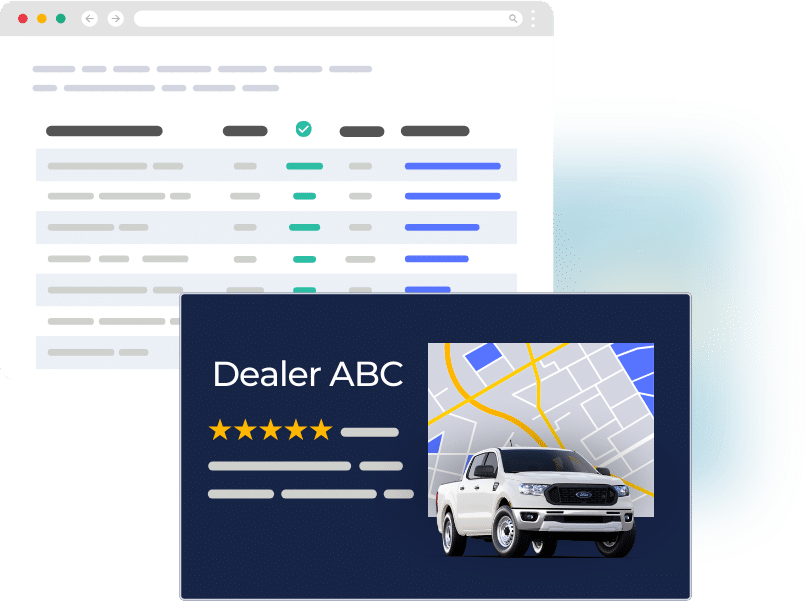Optimize Meta Data for Dealership SEO

Having optimized meta data on your dealership website is crucial for search engine optimization (SEO). The meta data provides information about your web pages to search engines like Google, allowing them to better understand and rank your content.
As a dealership, you’ll want to focus on adjusting key meta tags like title, description, and keywords to improve your site’s visibility and traffic.
In this article, the Dealers United SEO team informs you on some of the best ways to use meta data throughout your car dealership website.
What is Meta Data as it Relates to SEO?
Meta data refers to information that describes and gives context to other data – in this case, the webpages on a website. When it comes to SEO, meta data helps search engines understand both the content, and relevance, of webpages in order to rank them appropriately in search results.
There are few different terms you’re going to want to remember when it comes to meta data for your auto dealership website:
- Page titles: The title tag, which appears at the top of the browser and as the clickable headline in search results. Titles should be descriptive, concise, and contain relevant keywords.
- Meta descriptions: A short summary of the page content that shows up under the title in search results. The description should provide a compelling overview that encourages clicks.
- Structured data: Coded information, like schema markup in JSON-LD format, that allows search engines to understand complex data like reviews, sales events, vehicle types, etc.
Keep in mind that meta data is often the very first interaction that a user has with a website. This is your first impression for 95% of all searchers.
Here is an example of how meta data is seen from a searcher’s point of view:
Having great meta data can increase the click through rate dramatically on your site, leading to a direct increase in vehicle sales.
Page Titles
The title tag appears at the top of the browser and is the first thing users see in search results, so it’s important to make it descriptive, concise, and keyword-rich.
An effective title structure for dealership pages is: [Target keyword] – [Dealership name] – [Location]
For example, if you owned a Toyota dealership in Miami, this may be a great title tag for your dealership website: Certified Pre-Owned Toyota Vehicles – ABC Toyota – Miami, FL
Aim to keep titles under 60 characters. Include your target keywords, dealership name, and location in the title so search engines can quickly grasp what the page is about.
Do not try to ‘stuff’ keywords in the meta description. This will not help you accomplish much of anything. In fact, if you try to cram too many keywords within your meta data, it can do more harm than good!
Meta Descriptions
The meta description gives a summary of the page content in search results. Craft compelling descriptions 150-160 characters long that capture the essence of the page and entice users to click through. Include target keywords naturally in the description.
For instance, a certified pre-owned vehicles page may have a meta description like:
Browse our extensive inventory of certified pre-owned Toyota vehicles. All CPO cars and trucks come with a vehicle history report and limited warranty. Financing available.
Structured Data
Structured data refers to code or markup that adds additional context and information to a webpage in a way that search engines can understand.
When implemented properly, structured data can help dealership websites rank better by providing search engines with more insights about their content and offerings. Here are some key ways it can help:
- Rich Snippets: Structured data enables rich snippets which are special listings in SERPs that stand out with images, reviews, pricing and other details. These rich results tend to garner more clicks.
- Enhanced Listings: Markup can provide extra info like working hours, address, and dealer contacts for an enhanced business listing in SERPs.
- Improved Understanding: Structured data gives clarity about inventory, reviews, events and other website content. This helps search engines comprehend and index pages better.
While Google claims to support all formats, structured data implemented in JSON-LD is more likely to be displayed as rich results in the SERPs. The company recommends JSON-LD for maximum compatibility and performance. For dealership sites, JSON-LD can provide SEO value by highlighting inventory, dealer info, events and other key details in the search results.
Why is Meta Data Important For SEO?
Meta data is especially important for car dealership websites because it helps improve their visibility and rankings in search engine results pages (SERPs).
Here are some key reasons why optimized meta data matters for dealerships:
- Helps search engines understand dealer pages: Meta descriptions, titles, and keywords teach search engines about the dealer’s inventory, services, specials, etc. This leads to better indexing.
- Attracts local searchers: With location-optimized titles and keywords, search engines can better understand that a dealer serves local customers in a particular city or region.
- Describes inventory accurately: Metadata can categorize inventory pages by make, model, trim, year, etc. making it easier for customers to find the right vehicle.
- Encourages clicks on SERPs: Compelling meta titles and descriptions can entice searchers to click instead of going to competitor pages.
- Builds authority and trust: Professional, consistent meta data gives the impression of an authoritative, trustworthy dealership.
- Supports paid SEM campaigns: Optimized metadata improves click-through rates and quality scores for paid search ads.
Dealers who overlook meta data are missing out on an opportunity to improve website visibility, traffic, and conversions. The right metadata strategy can attract more high-intent customers searching for their next car.
Summary – Meta Data is Still Important
Meta data is still very important for SEO. While meta tags like keywords have decreased in emphasis, meta titles, descriptions, and structured data remain crucial.
At a minimum, make sure your title tags, and description tags are made with user intent in mind. If you want to take a more advanced position on your dealer site, include items like JSON schema.
Want to learn how Dealers United’s SEO services will help refresh your meta data periodically with keyword-optimized titles, descriptions, and keywords that help improve your dealership website’s visibility on Google search?
If you need help, we are equipped with a team of experts trained to focus on crafting compelling, informative meta data about your inventory, or services, that effectively conveys your offerings to searchers.







